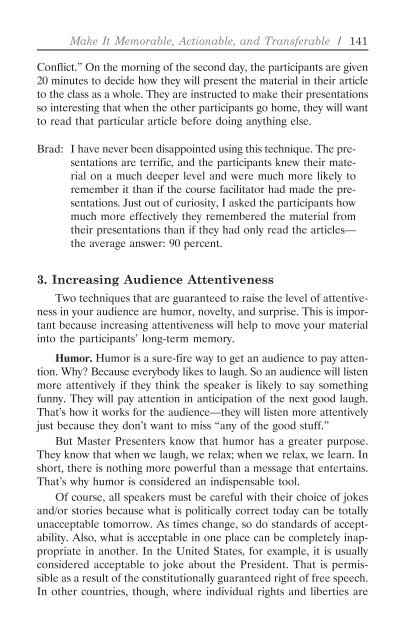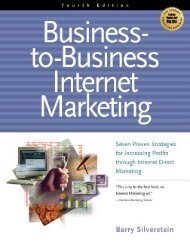The Seven Strategies of Master Presenters - Lifecycle Performance ...
The Seven Strategies of Master Presenters - Lifecycle Performance ...
The Seven Strategies of Master Presenters - Lifecycle Performance ...
You also want an ePaper? Increase the reach of your titles
YUMPU automatically turns print PDFs into web optimized ePapers that Google loves.
Make It Memorable, Actionable, and Transferable / 141<br />
Conflict.” On the morning <strong>of</strong> the second day, the participants are given<br />
20 minutes to decide how they will present the material in their article<br />
to the class as a whole. <strong>The</strong>y are instructed to make their presentations<br />
so interesting that when the other participants go home, they will want<br />
to read that particular article before doing anything else.<br />
Brad: I have never been disappointed using this technique. <strong>The</strong> presentations<br />
are terrific, and the participants knew their material<br />
on a much deeper level and were much more likely to<br />
remember it than if the course facilitator had made the presentations.<br />
Just out <strong>of</strong> curiosity, I asked the participants how<br />
much more effectively they remembered the material from<br />
their presentations than if they had only read the articles—<br />
the average answer: 90 percent.<br />
3. Increasing Audience Attentiveness<br />
Two techniques that are guaranteed to raise the level <strong>of</strong> attentiveness<br />
in your audience are humor, novelty, and surprise. This is important<br />
because increasing attentiveness will help to move your material<br />
into the participants’ long-term memory.<br />
Humor. Humor is a sure-fire way to get an audience to pay attention.<br />
Why? Because everybody likes to laugh. So an audience will listen<br />
more attentively if they think the speaker is likely to say something<br />
funny. <strong>The</strong>y will pay attention in anticipation <strong>of</strong> the next good laugh.<br />
That’s how it works for the audience—they will listen more attentively<br />
just because they don’t want to miss “any <strong>of</strong> the good stuff.”<br />
But <strong>Master</strong> <strong>Presenters</strong> know that humor has a greater purpose.<br />
<strong>The</strong>y know that when we laugh, we relax; when we relax, we learn. In<br />
short, there is nothing more powerful than a message that entertains.<br />
That’s why humor is considered an indispensable tool.<br />
Of course, all speakers must be careful with their choice <strong>of</strong> jokes<br />
and/or stories because what is politically correct today can be totally<br />
unacceptable tomorrow. As times change, so do standards <strong>of</strong> acceptability.<br />
Also, what is acceptable in one place can be completely inappropriate<br />
in another. In the United States, for example, it is usually<br />
considered acceptable to joke about the President. That is permissible<br />
as a result <strong>of</strong> the constitutionally guaranteed right <strong>of</strong> free speech.<br />
In other countries, though, where individual rights and liberties are










